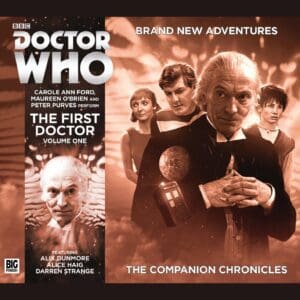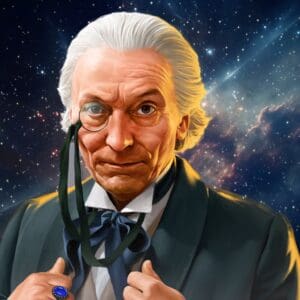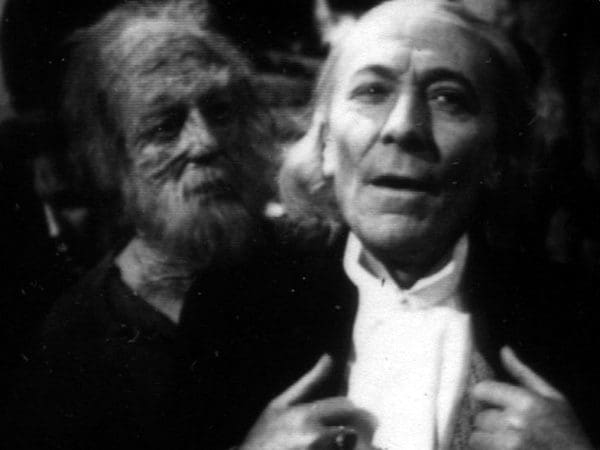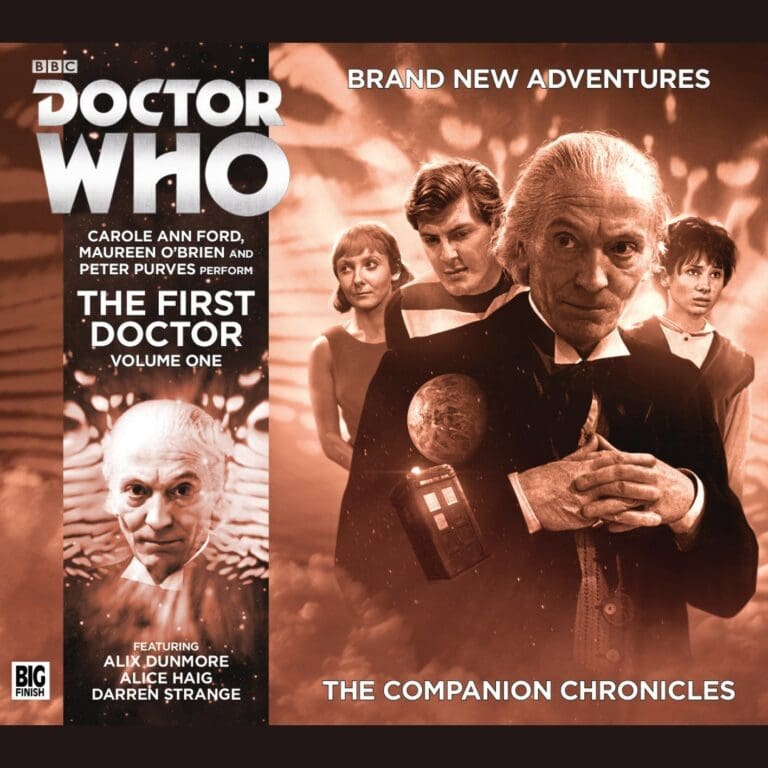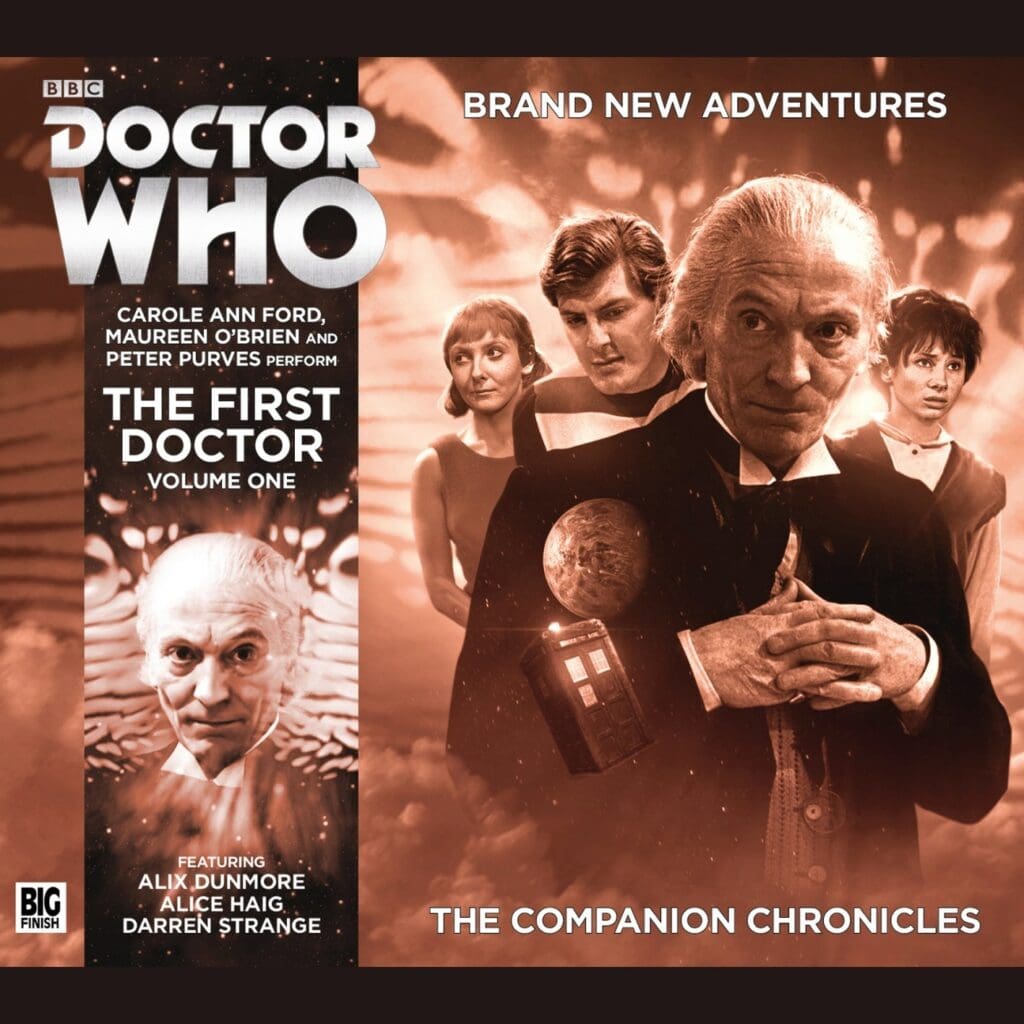
The Companion Chronicles: The First Doctor Volume 1 • Episode 3
The Founding Fathers
Sets:
The Companion Chronicles
Reviews and links from the Community
Review of The Founding Fathers by Rock_Angel
This is a perfect Steven story it really puts his whole character out in the open I feel I now know who Steven is as a companion to the Doctor and I love it
This review contains spoilers
Review of The Founding Fathers by Joniejoon
The second part of the ‘Reign of Taylor” trilogy once again decides to take a “story in story” approach. This could be great, if only there was a connection between the two stories presented here….
Last time, Steven learned from his granddaughter Sida that a mind copy of the doctor was going to take part in his country’s election. Disgusted by this idea, Steven meets up with the brain in a jar that calls himself “The Doctor”. Soon, it turns into story time again.
If that short synopsis felt a little jarring to you, that’s the point. I’ve listened to five different “story in story” tales by Guerrier, but it has never felt as tacked on as it is here. Steven sets out to prove that the mind copy is not like the Doctor, so he launches into a tale of Benjamin Franklin that basically has no relevance at all instead of one sentence at the end. Let’s talk about that Franklin story first.
Our party of Doctor, Steven and Vicki (my beloved) land in London, 1762. They accidentally lock themselves out of the tardis by leaving the key inside. The Doctor know he can build a solution, but he will require the help of the sharpest mind in this time period: Benjamin Franklin.
They meet the man in question in talks with a woman called Abigail. Franklin is apprehensive, since his romantic relationship with Abigail is extramarital. They soon convince him, however, by expressing how much they love science and his work. Even proposing to set up a new experiment with another kite.
It's an okay premise on its own, but by no means brilliant. Like the Savages, it feels like it does not really want to question the scenario it creates. For example, it does not question Franklin’s infidelity once, which is a bit shitty
A quick Google showed me that Benjamin Franklin was far from loyal and had several affairs in his life. Some sites even describing the amount as "countless”. That kind of breaks the image this tale is going for. We are only supposed to look at the scientific brilliance of the man. A true hero. Yet at the same time this story brings up his infidelity and makes Abigail a major part of the story. It feels disingenuous.
Eventually, we reach the point where our party has tied a kite to a machine the Doctor has built to open the lock. Eventually this leads to our party’s escape and off into space they go.
It’s all just passable really. Nothing really stands out. It doesn’t help that we really only have the voice of Steven to tell this story. He’s our only narrator. This causes character like Franklin to not have as much depth as he would have had with his own voice. Same for Vicki. It’s still okay without them, but maybe a few more voices would have helped it.
It's not like this would have broken the narrative either, because the character of Abigail is voiced. So a step has already been set in that direction.
So, as we move back to our “King Steven” plotline, how does this story prove that the mind copy isn’t like the real Doctor? Well, the key is Abigail, who wasn’t remembered in the history books. Some would call her unimportant, but the Doctor never would.
Yet the mind copy has sacrificed a life when he tried to gain a physical body. The copy considered someone unimportant enough to sacrifice. This goes against the principles of the Doctor, which is why Steven can’t accept him. The mind copy, upon hearing this, accepts Steven’s viewpoint and decides to shut himself down and turn into computer code instead. Because apparently that’s something he can do.
It doesn’t really stick together at this point. The fact that Abigail was forgotten in history is given no focus in the Franklin story except for a few sentences. Yet that’s the big revelation we had to get from it. It feels very separate. Not connected at all.
That lack of connection also shows in all the connective moments between the storylines. There are short moments where we stop telling the Franklin story to get some quick banter between the mind copy Doctor and Steven. But this banter is also inconsistent. There are moments where Steven calls the mind copy “The Doctor” and other moment he gets angry and says the copy will never be the doctor. And it isn’t presented as some kind of inner conflict. It is just something that happens without any attention being paid to it. I think there are just moments where the writing forgets the two aren’t supposed to like each other.
That’s not even mentioning the resolution where the mind copy turns into computer code. It feels incredibly arbitrary and isn’t set up at all. It just happens and is accepted by everyone. This just raises questions for me. Why not just “shut off” the mind copy? why take this route into code that has absolutely no basis in the storytelling at all?
And I mean, I know the answer, because there is a part 3. But if this is all just setup, it could’ve been handled way better. Moments should happen as logical consequences of earlier moments. Not because random future storytelling calls for it.
It’s all just becoming a mess at this point. It feels like separate ideas were created, before being duct taped together. The two stories don’t connect in any logical way, the whole deal with Benjamin Franklin leads to nothing in the grand scheme of things and the Mind copy turning into code is nothing but setup. Meanwhile, the story just hopes you don’t pay attention the giant holes it tears in its own plot. Whether it is Franklin’s infidelity, the connection between Steven and the mind copy or the resolution with computer code.
“The Founding Fathers” is a mess of ideas. While it does have intriguing moments and setups, it never quite comes together as a well thought out, cohesive whole. At the same time, none of the separate pieces are strong enough to stand on their own either, which leaves us with very little. You can look at every element and wonder how it could’ve been better, but that doesn’t change what it currently is. A failed attempt at “story in story” composition.
External Reviews / Opinion pieces
Community Ratings
(Updates coming soon:)
Add the last X members who rated it here
Add number of Favs, and who they are, here
